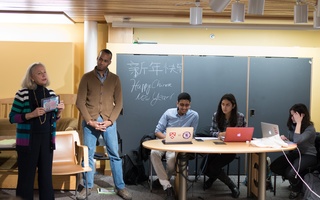Earlier this month, Irfan Siddiqi '98 left his room before dawn, heading to the basement of Canaday E for the first of his five required daily prayers to Allah.
Siddiqi knew the way to the cramped, Spartan prayer room in the Canaday basement where he prays each day.
But when he arrived, he and several other practicing Muslims who use the Canaday mosque found that the locks had been changed, and no one could get in.
"When they changed the locks in the basement," Siddiqi says, "we were locked out for a considerable amount of time."
In fact, it took several trips to the Facilities Maintenance department before he could get a working key.
That's often the way it goes for the approximately 500 Muslims enrolled in the College and the Graduate School of Arts and Sciences. Despite the fact that they represent one of the fastest growing creeds in the College, Islamic students say the Harvard administration still doesn't take their concerns or religious needs seriously.
For example, the small Canaday mosque is the seventh location Muslim undergraduates have been forced into in the past six months, according to two students' count. Students have had to use locations from the Straus Hall common room to Memorial Hall to distant Vanserg Hall, which is 20 minutes' walk from the Yard.
"We need to come a long way," Acceptance on Campus Mohammed N. Khan '95, president of the Harvard Islamic Society, says one of the biggest problems facing Muslims in America stems from images of Middle East violence in the 1980s. "The stereotypical image is of a terrorist blowing up the World Trade Center," Khan says. "There has to be a clear separation between the politics of a nation and the religion itself." Despite the stereotype of "terrorism" in America, Khan says that Harvard students are usually open and understanding about his religion. "In my discussions [at Harvard], I haven't come across too many misconceptions," Khan says. Uzma Ahmad '96 of Kirkland House says she believes that Harvard's emphasis on diversity has helped improve relations with the student body and within the Islamic community on campus. "I find a lot of students who are very interested in what it means to be a Muslim," Ahmad says. Ahmad says the Islamic community at Harvard is very diverse within itself, with believers of many nationalities and races. Encountering such diversity within her faith, she says, has helped her "grow a lot as a Muslim." Read more in NewsRecommended Articles














